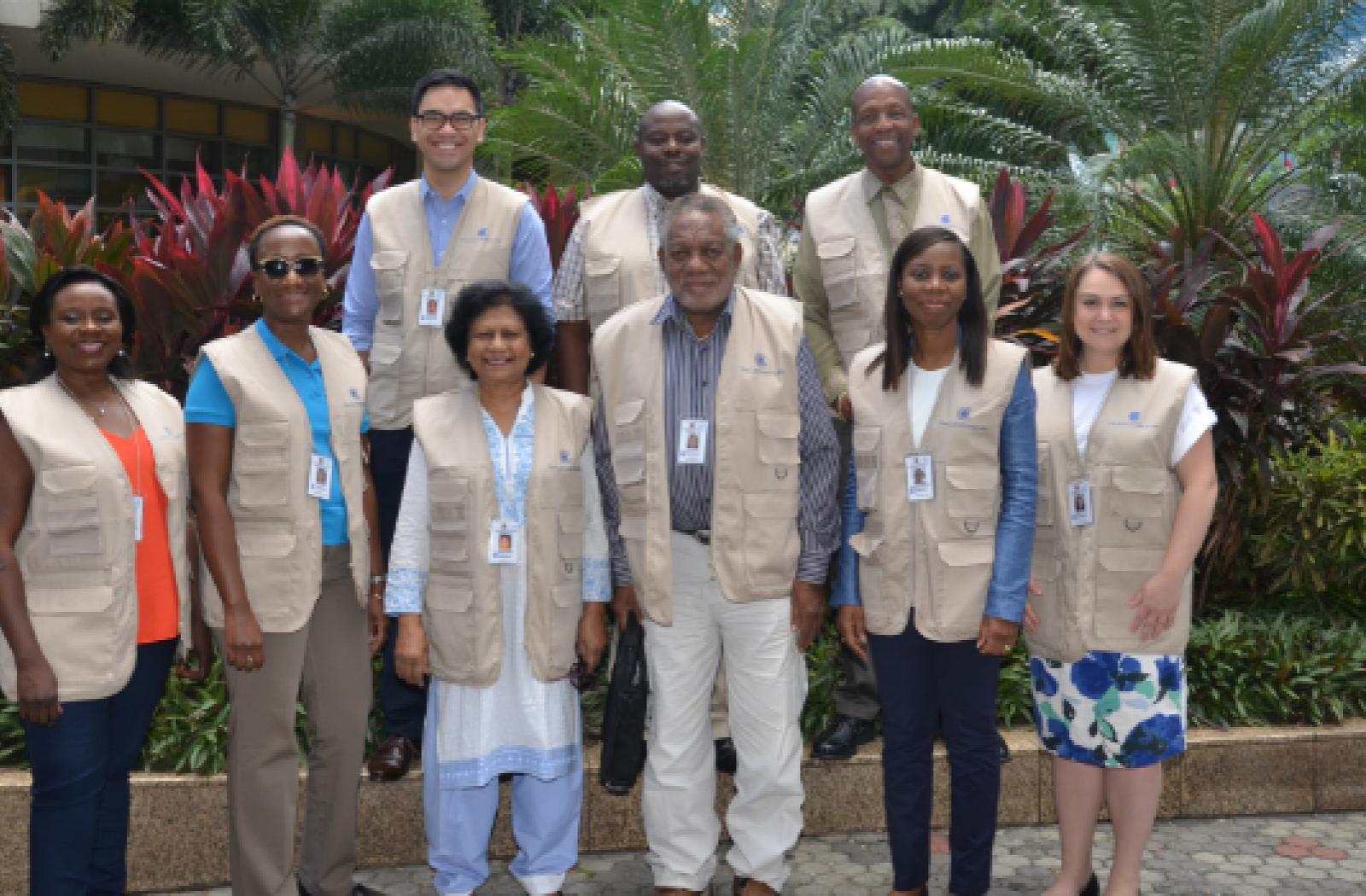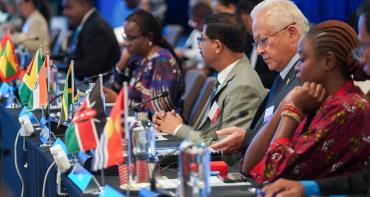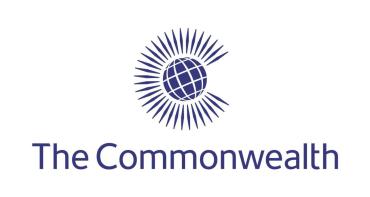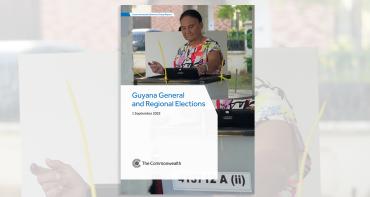The Commonwealth Observer Group commends the people of Trinidad and Tobago for the peaceful and orderly manner in which they exercised their right to vote on 7 September.

The Commonwealth Observer Group commends the people of Trinidad and Tobago for the peaceful and orderly manner in which they exercised their right to vote on 7 September.
The Group has been present in the country since 31 August. During this period, we met with the Elections and Boundaries Commission (EBC), political parties, civil society, including women and youth groups, media representatives, the Police, Commonwealth High Commissioners and the CARICOM electoral observer mission.
On 4 September, Commonwealth teams deployed throughout Trinidad and Tobago to observe the election environment and preparations for the elections. Ahead of election day, teams met electoral officials and police at the district level to build up a holistic picture of the electoral process and environment. The teams also met political party representatives and observed campaign events around the country.
The following is an initial assessment of the critical aspects of the elections process and the electoral environment. We will issue a final report on the entire process at a later stage.
Key findings
Pre-election environment
Overall the campaign period was peaceful and rallies were festive. We appreciated the carnival spirit that characterised the rallies, against the background of a tightly contested election. The fundamental rights of candidates, political parties and supporters to assemble and campaign were observed. We did not witness any incidence of campaigning on election day.
In our briefings, however, attention was drawn to the surge of vitriolic and personal attacks exchanged between political parties on the campaign platform. We note that while major parties were signatories to the voluntary Code of Ethical Political Conduct, they did not fully demonstrate their commitment to its tenets.
Concerns were also raised about the lack of transparency and accountability regarding the financing of political parties. We note that, while there are rules governing the expenditure of candidates, these do not apply to political parties. We were informed of significant spending by parties during the campaign. There were also concerns that the lack of campaign finance rules gave the incumbent party an undue advantage.
We were, however, encouraged that there was broad support for reform in this area and were pleased to hear from stakeholders that the EBC is reflecting on proposals that will regulate the registration of political parties, as well as campaign finance. We recommend that the EBC, the incoming Parliament, political parties and all relevant stakeholders prioritise this process.
Media environment
The media in Trinidad and Tobago is vibrant and largely independent. Generally coverage during the campaign was balanced and fair, with features and opinions that represent the perspectives of the contesting parties. However, smaller parties complained about their limited access to the media. Concerns were also raised about significant increases in advertising rates in the run-up to the elections and equal opportunities for all parties, regardless of size, to effectively promote themselves.
The content of adverts was also highlighted as a point of contention, with stakeholders calling for clearly defined standards for advertisers and media outlets. We recommend consideration be given to establishing an independent media monitoring mechanism during elections.
The voting process
Prior to election day we observed Special Voting across Trinidad and Tobago. We were satisfied that the voting was conducted according to the processes outlined by the EBC.
On polling day, 7 September, our observers reported that voting stations opened on time. Presiding Officers and polling officials largely observed the prescribed procedures. At the opening of polls and throughout the day, voters exercised their franchise in a largely smooth process.
We found very few cases where voters were disenfranchised due to the absence of their names in the Unit Register. In our briefings, however, concerns were raised about the need to clean the register of deceased persons and those who may no longer reside in the constituencies where they originally registered. The EBC briefed us on how the Commission cleans the register. We urge that these efforts be strengthened.
In a few cases, voters were unable to vote because they had been registered as ‘special electors,’ although they informed polling officials that this was done without their knowledge. We take note of this and will reflect on it in our final report.
We witnessed the participation of elderly and disabled voters and were encouraged by the professionalism and confidence of the young people, mainly women, who constituted the presiding officers and polling officials.
Our overall assessment of the voting process, based on our observations, is that it was conducted in a peaceful and orderly manner, according to the procedures outlined in the laws of Trinidad and Tobago. The electoral environment on polling day was conducive to the free exercise of the people’s franchise and basic freedoms were respected.
Closing, counting and the results process
The EBC extended the hours of the poll by one hour to 7:00pm in Trinidad due to inclement weather.
The closing, counting and tabulation appeared in line with prescribed procedures and were conducted in a transparent manner by polling officials. Polling agents were patient and collegial. Most polling stations closed on time, and in some stations, assigned police officers assisted polling staff in setting up the polling stations in a manner conducive for the counting of votes.
The accounting process for all ballots received was complied with. We note that there were very few spoilt ballots. Rejected ballots were decided amicably in most instances.
Where we observed the intermixing of special elector ballots with ordinary ballots, it appeared some of the presiding officers and polling staff were not very familiar with the process. However, we note that where misapplication of procedures were made, they were promptly rectified. Although this resulted in a lengthy and arduous process, we were satisfied that polling officials were carefully following the prescribed rules for accuracy and transparency.
We conclude that the closing and vote-counting was conducted according to the laws of Trinidad and Tobago. These rules incorporate a number of rigorous checks that safeguard the integrity of the process.
We recommend the EBC ensures that adequate training is provided for polling officials who will be involved in the process of intermixing special elector ballots with ordinary ballots at the count.
Conclusions
The Parliamentary Elections of 7 September affirmed the country’s track record of peaceful and credible elections and demonstrated the commitment of the people of Trinidad and Tobago to democracy. Based on our observation and consultations with a broad range of stakeholders, our preliminary conclusion is that the poll was inclusive, peaceful and well conducted.
The minor shortfalls observed to date by members of the Group are not significant enough to question the credibility of the outcome.
We would be remiss not to highlight the exemplary role played by the EBC, an institution that enjoys a high degree of confidence amongst the electorate and all the stakeholders that we met.
Above all, the Group commends the people of Trinidad and Tobago for the peaceful and orderly manner in which they exercised their franchise.
In our final report, we will reflect further on possible areas for improvement. This report will be submitted in due course to the Secretary-General of the Commonwealth, who will subsequently share it with relevant stakeholders before it is made public.



